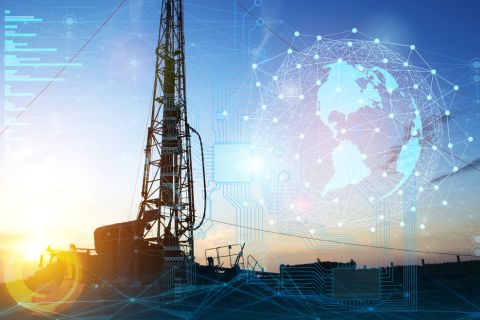Presented by:

This article appears in the E&P newsletter. Subscribe to the E&P newsletter here.
In a world more connected than ever, there are still communication barriers in the oil and gas industry. Whether it’s acquiring, understanding or integrating new technology, operators sometimes lack the amount of data necessary to fully take advantage of their drilling systems.

“Sometimes people will buy a technology, and it’s like getting a gym membership—they think they’re going to lose weight and get muscles just by having it,” said David Reid, CTO and chief marketing officer with NOV Inc.
Without the proper data needed to run operations, advanced technology doesn’t do a lot of good. Therefore, data sharing is key to successful technological integration in the oil and gas industry.
During SPE's recent webinar, “Technical Director Series: DSEA and Drilling," Reid was joined by Silviu Livescu, SPE DSEA technical director and an associate professor, sustainable geoenergy research and engineering, at The University of Texas (UT) at Austin, to discuss the benefits of data sharing and “easy wins” in terms of drilling systems.

(Source: LinkedIn)
“I will preach that data sharing is probably the most important thing,” Livescu said. “From my point of view, show me the data; all the datasets have magic on it. I still don’t think we model actually to share the data effectively.”
Data sharing in drilling between companies, according to Reid, was “a journey of trust more than technology.” Through this method, as opposed to the standardization of different models and systems, companies are more connected, which allows the passing on of ideas and innovations to flow more smoothly.
“It caused a lot of weird behavior at first, a lot of contractual conversations for sure, but it seems to be getting better as my observation,” he said. “From our perspective, working with the service companies, we have active projects where we work together.”
Reid said people are beginning to understand the integration side.
“We had a long period, or it felt like a long period, where people were not sharing as much," he said. "Although it’s not global, there definitely are projects where you’re getting more integrated systems from everybody where we’re seeing data shared, and of course that’s a huge value in itself.”
While it may not come naturally to operators, as businesses try to guard technological and data advances to give themselves a competitive edge, Reid and Livescu believe there are more benefits to data sharing in the long run.
“We are trying to actually bring together communities to at least talk about how we can share more data effectively,” Livescu said. “There are many things we are working on within [the company]; we are trying to help as much as can with the data sharing.”
While there is a blend of skill sets, Livescu believes data sharing holds promise for the future of the industry—from advancing new technologies to ushering in a new generation of energy professionals—and a clear focus is the one skill he thinks will be the most important.
“I don’t think it’s about the skill set or about the technology itself; I think it’s more about the focus we need to come up with, the vision, what exactly we want to achieve [and] by when,” Livescu said. “The energy and data will show up unless we cannot see. The data is already there; we just need access to it and to make it easily available to everybody.”
Recommended Reading
Seadrill Awarded $97.5 Million in Drillship Contracts
2024-01-30 - Seadrill will also resume management services for its West Auriga drillship earlier than anticipated.
TotalEnergies Starts Production at Akpo West Offshore Nigeria
2024-02-07 - Subsea tieback expected to add 14,000 bbl/d of condensate by mid-year, and up to 4 MMcm/d of gas by 2028.
Well Logging Could Get a Makeover
2024-02-27 - Aramco’s KASHF robot, expected to deploy in 2025, will be able to operate in both vertical and horizontal segments of wellbores.
Shell Brings Deepwater Rydberg Subsea Tieback Onstream
2024-02-23 - The two-well Gulf of Mexico development will send 16,000 boe/d at peak rates to the Appomattox production semisubmersible.
E&P Highlights: Feb. 26, 2024
2024-02-26 - Here’s a roundup of the latest E&P headlines, including interest in some projects changing hands and new contract awards.





